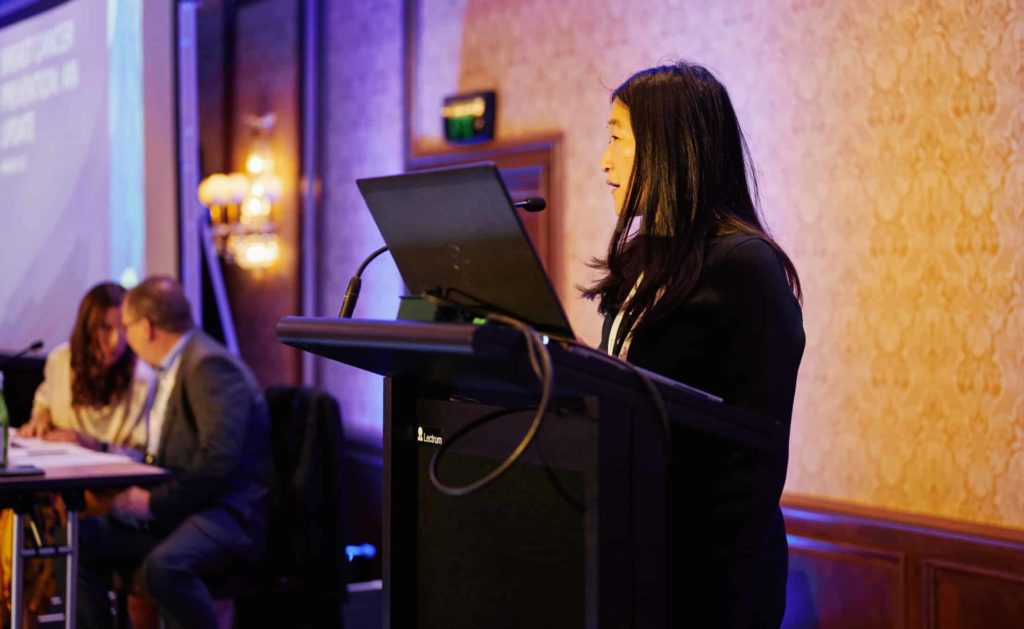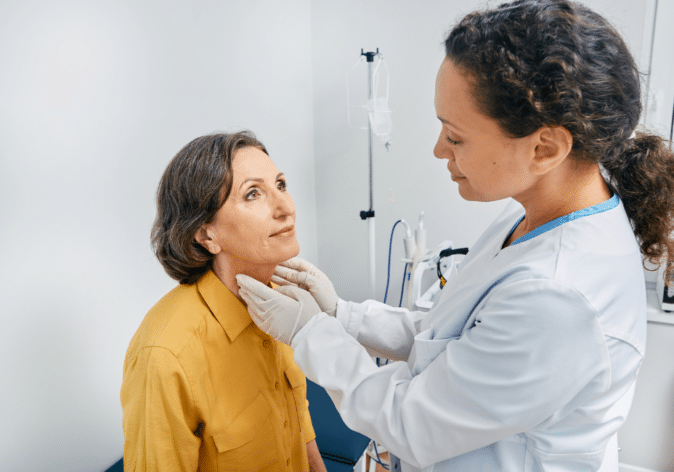Breast Cancer Prevention
Women who have a 30% chance of developing breast cancer over their lifetime are classified as very high-risk individuals. While preventative treatments, including a bilateral mastectomy, certain medications and regular breast screening can be effective in reducing the risk of breast cancer, these aren’t always an option for some patients.
While there is no way to prevent breast cancer, there are steps that can be taken to lower one’s risk of being diagnosed, particularly for women with a strong family history or those who carry a gene mutation.
The theme for Breast Cancer Trials 43rd Annual Scientific Meeting (ASM) was Breast Cancer in Young Women.
We asked Dr Wanda Cui what the differences are in prevention, screening and diagnosis of a young women compared to postmenopausal women.
“I guess we know that in Australia, the screening program or the national screening program really focuses on older women because we know that the risk of breast cancer tends to increase with age.”
“However, we know that, certainly over recent decades the risk of breast cancer in younger women is also increasing as well and certainly that incidence is rising. In terms of the difference for screening and prevention for younger women, at the moment for women under the age of 40, we don’t routinely offer screening and certainly some of our traditional screening methods, like mammogram, can have a lower sensitivity in these women as well.”
“Also, for young women, there’s a group who are at higher risk because of genetic factors, which may increase their risk of developing breast cancer at a younger age, and one of the troubles is that it’s not common. One of the troubles is trying to identify who those women are, who has an increased risk and should be offered earlier screening as well as prevention strategies to try and reduce their risk of breast cancer both at a younger age, but also into older age as well.”
“I think that’s a real challenge in terms of prevention in young women and that kind of education piece of: What is my risk? How do I assess it? How do I know what screening should I have? What are the strategies to try and reduce my risk of breast cancer, if I’m found to be at an increased risk?”
Listen to the Podcast
Listen to our conversation with Dr Wanda Cui as she discusses breast cancer prevention and her research on this topic.
Where is Research Currently at in Preventing Breast Cancer?
“So that’s a good question, certainly for women who are found to be at a high-risk of breast cancer, which is if you’ve got a chance of developing breast cancer of 30% or over throughout your whole lifetime you’re classified as very high risk.”
“For those women in general we would discuss things like a bilateral mastectomy, which is where you have your breasts surgically removed, which we know is very effective at reducing the risk of breast cancer in those very high-risk women.”
“But that’s not necessarily for everybody and in women who are at increased risk we would also recommend regular screening, but also there are some medications that can be used to try and reduce your risk. Things like tamoxifen as well as anastrozole have been shown to reduce your risk of breast cancer by anything between 30% to 50% and not only when you’re on the tablets, but also for the years following as well.”
“The trouble with those tablets is they only reduce one type of breast cancer, which is HR+ breast cancers and not so much for HR- breast cancers. That’s something that we need to do more research into, how do we prevent those cancers in women who choose not to have bilateral mastectomy surgery to have their breasts removed?”
“That’s one area that BRCA-P is really addressing. In those BRCA-1 carriers, we know that HR- cancers tend to be the more prominent type of cancer that these women develop. And whether or not this drug could reduce that, I think that would be practice changing if we found out that was a positive study.”
“There are some modifiable risk factors for the general population. Certainly, we know some of the evidence for obesity is stronger in women who are postmenopausal. But still, I think that encouraging a healthy lifestyle, so reduced obesity and increased exercise is important.”
What are Modifiable Risk Factors for Young Women?
“So, increased exercise, even in somebody who’s not overweight is still important for reducing your breast cancer risk, as well as reducing levels of alcohol. We know that there’s no safe threshold below which you are safe from developing breast cancer. But we know that the more alcohol you drink, the more it increases your breast cancer risk. So really trying to minimise that, not only from a breast cancer perspective, but also from a general health perspective as well.”
“One challenge is that we know for very good societal reasons, especially as women become more educated and are moving into their careers, that childbearing is now delayed and breastfeeding may not be for as long as we what it used to be. And we know that those are some risk factors for breast cancer, but I think we have to weigh that up with the risk of breast cancer, which is only slightly increased, versus the very beneficial reasons for why women delay childbearing.”
“I think there’s no there’s hard rule here, and I think we must weigh that up for each individual woman. Certainly, in countries like Sweden and there have also been some studies conducted in the US, where they’ve shown that encouraging women to have parental leave has been a way to improve longer breastfeeding.”
“That might be something that we can look at from a policy standpoint, which would benefit women from a breast cancer perspective, but also just in general from a societal perspective as well.”
“I’m an optimist, which is why I’m an Oncologist. I hope that one day we will get to a stage that we are able to prevent breast cancer. Whether or not we will get to zero I guess is very difficult. But you know, I think that we need to strive for it.”
Dr Cui’s Hope for the Future
“If you don’t shoot for the stars, you don’t ever get there. So, I think breast cancer prevention is important. It may not be as sexy as some of the new treatments that come out of breast cancer treatment, but we know that even if we do cure a woman of breast cancer, going through that journey is hard.”
“If we can try and prevent more women from being diagnosed in the first place, I think that that’s a great goal to aim for.”
Support Us
Help us to change lives through breast cancer clinical trials research



